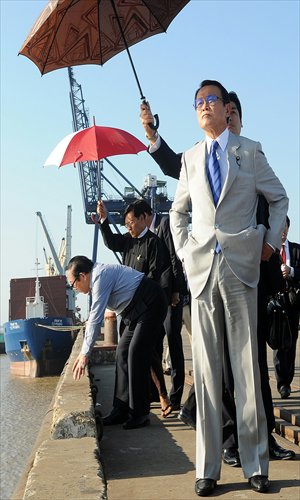Japan courts Myanmar as China watches

During his first overseas trip to Southeast Asia, newly inaugurated Japanese Prime Minister Shinzo Abe stressed once more Japan's interest in cooperation with Myanmar on Thursday, a couple of weeks after Deputy Prime Minister Taro Aso's visit to the country.
According to Asia News Network, Abe expressed an interest in joining with Myanmar and Thailand to develop the Dawei special economic zone in southern Myanmar.
Abe's remark came shortly after Aso, whom Myanmar President U Thein Sein called a "long-standing and sincere friend" of the country, reaffirmed on January 3 Japan's intention to secure a debt waiver and fresh loans to Myanmar during his trip to the country.
He pledged to waive about 300 billion yen ($3.33 billion) that Myanmar owns Japan in debt and to provide a fresh chunk of 50 billion yen loan, as the first tranche of loans to support the infrastructure development in Thilawa.
Moreover, Myanmar's opposition leader Aung San Suu Kyi, at the invitation of the Japanese government, plans to visit Japan, probably in March, and meet Japanese political and economic leaders, NHK reported, which will mark her first visit to Japan in 27 years.
Long ties
As Myanmar's largest creditor, Japan's interest in Myanmar has many deep and tangled roots.
Although the image of Japan among the Myanmar people is, at best, mixed, many regard it as a country that helped them undermine the British colonial rule during World War II.
In fact, many Myanmar political leaders during this period were Japanophiles, because they had received training and education in Japan.
Suu Kyi's father General Aung San was one of them, though he later turned against Japan and supported the British to drive the Japanese out of the country in 1945.
The Japan-Myanmar relationship has been further reinforced by Japan's continuing economic and diplomatic support of the country, even during the 1990s, when several Western countries introduced sanctions against the military regime.
However, Japan gradually became estranged from Myanmar after Japan started to adopt a carrot and stick policy toward Myanmar in the 1990s, which prescribed that Japan should take into account Myanmar's record on military spending, democracy and human rights when making decisions to provide economic aid to the country.
"Japan has always been hoping to resume its influence in Myanmar. Many members of the Japanese political elite have been planning for this for a long time," Bi said.
Sharing borders with booming India and China, Myanmar offers naval access to key shipping lanes in the Indian Ocean. The location is of great strategic significance for resource-poor Japan, which relies heavily on the import of energy resources and raw materials.
"Myanmar's political and economic reforms provide a very good opportunity for Japan," he said.
Balancing Beijing
Besides Myanmar's strategic location, Japan's economic and diplomatic drive in the country has another reason: China.
The investment of China in Myanmar, as the country's biggest trading partner followed by Thailand, has reached a new peak and accounts for 34.4 percent of the total foreign direct investment inflow to Myanmar up to October 2012, according to a UN report.
"Japan has been concerned for a while that China' s influence in Myanmar was oversized, so recent developments are a way to bring this into better balance," James Schoff, former senior adviser for East Asia policy at the US Office of the Secretary of Defense, told the Global Times.
Implicated in an increasingly intense territorial dispute with China over the Diaoyu Islands, Japan's interest "is undoubtedly strengthened by the Japanese business community's hope to find alternative sources of growth in Asia outside of China," Thomas Berger, professor of International Relations with Boston University, told the Global Times.
He added that the interest is also strengthened "by Japanese strategists who want to support the US in reaching out to Myanmar and making sure that it does not become a Chinese strategic outpost."
Corruption frustrations
Meeting with visiting Chinese high officials in Nay Pyi Taw on Sunday, Speaker of Myanmar's parliamentary House of Representatives U Shwe Mann said that maintaining friendly bilateral ties with China is always the Myanmar people's firm choice, the Xinhua News Agency reported.
He made the remarks one day after Thein Sein met with China's visiting special envoy Fu Ying in Yangon.
However, several Chinese-funded projects in Myanmar have been abruptly halted or suspended since 2011, including the Myitsone dam project and the Letpadaung copper mine project, which analysts say has marred bilateral relations.
China should try to improve its image among ordinary people in Myanmar to avoid losing more ground in the rivalry with Japan in the future, Bi said.
"The ordinary Myanmar people are disgusted with the corruption of the former military regime. Chinese companies had to pay large 'commissions' to government officials when they invested in Myanmar in the past, which also impaired the image of Chinese companies," he said.
However, he also noted that China will remain a significant economic and diplomatic player in Myanmar, given China's close trade ties with the country.
As well as Japan, many other world powers are also trying to profit from the country's opening up.
Following the US and Japan, India, South Korea, Russia and the EU have also sent friendly signals to Myanmar.
"The next few years are going to be hugely influential and consequential with regard to which companies and countries get the best foothold in the Myanmar market, for decades to come," Schoff said.
Despite the world powers' rivalry, Myanmar is unlikely to be willing to become "a pawn in the power struggle," Berger said.
"They will cooperate with one side or the other to maximize the economic and political benefits, while being careful to preserve their independence, which means to avoid moving too far into one camp or the other."